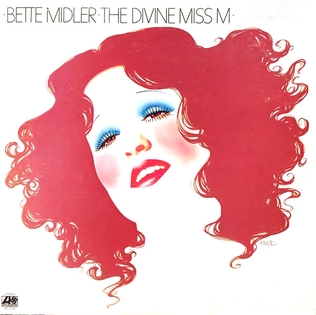The Divine Miss M
| The Divine Miss M | ||||
|---|---|---|---|---|
 |
||||
| Studio album by Bette Midler | ||||
| Released | November 7, 1972 | |||
| Recorded | 1971/1972 | |||
| Studio | Atlantic Recording Studios (New York, New York) |
|||
| Genre | Vocal, pop, traditional pop | |||
| Length | 41:03 | |||
| Label | Atlantic | |||
| Producer | Ahmet Ertegün, Barry Manilow, Joel Dorn, Geoffrey Haslam | |||
| Bette Midler chronology | ||||
|
||||
| Singles from The Divine Miss M | ||||
| Professional ratings | |
|---|---|
| Review scores | |
| Source | Rating |
| Allmusic |
|
| Robert Christgau | A− |
The Divine Miss M is the debut studio album by American singer and actress Bette Midler, released in 1972 on the Atlantic Records label. The title of the album refers to Midler's famous stage persona.
The album was co-produced by Barry Manilow, and includes several songs that since have become repertoire standards, such as "Do You Want to Dance?", "Chapel of Love", "Hello In There", "Friends" and "Boogie Woogie Bugle Boy".
The Divine Miss M reached the Top Ten on Billboard's album chart and was later awarded a Platinum Disc by the RIAA. In 1973, the album won Midler a Grammy Award for Best New Artist. "Do You Want to Dance?", "Boogie Woogie Bugle Boy" and "Friends" were all Top 40 hit singles from the album, with "Boogie Woogie Bugle Boy" climbing to #8 on the Billboard Hot 100 and reaching #1 on Billboard's Adult Contemporary chart.
The album was released on CD for the first time in 1990. A remastered version of the album was released by Atlantic Records/Warner Music in 1995.
A remastered deluxe edition was released in October 2016.
...
Wikipedia
